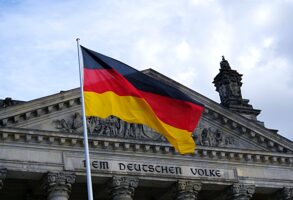
Published February 23, 2019
One of Emmanuel Macron’s most endearing qualities is his unshakable faith in his own power to convince anyone of the truth of his beliefs. Last November, the youngest-ever president of France tried to commemorate the 100th anniversary of the 1918 armistice by touring small French towns situated on the former front line to talk about world peace. It did not go well. The ordinary citizens he encountered were less interested in the history of the Great War than in voicing their anger at his economic policies—especially a recently announced increase in gas taxes—and seemed only to get angrier the more he assured them that things would improve. A week later, some 300,000 people, mobilized over the internet, donned yellow safety vests and began to set up barricades on thoroughfares across France. It was the first step in what has turned out to be a roiling, monthslong political crisis.
Mr. Macron’s rise has been astonishing. Unknown to the general public until 2014 and never before elected to political office, he smashed his rivals to win the presidency in May 2017. His party, founded just a year earlier, swept the June 2017 legislative elections, granting him a solid majority and wrecking the center-left Socialists and center-right Republicans (the country’s two traditional governing parties).
Mr. Macron seemed to represent—to coin a phrase—hope and change: change from the generally mediocre political class that has governed France for 30 years, hope that France might embrace market-based reform and provide a model for combating the populist wave sweeping the West.
Today, the hope is on life support, and the change has yet to be seen. France’s economy seems as stubbornly stuck in neutral as ever, with unemployment around 9% (and youth unemployment at 21%), government spending at 56% of GDP and debt rising. Mr. Macron has had the second-fastest drop in popularity of any French President.
What happened?
Mr. Macron is unpopular today because he has never really been popular. He saw a brief surge of support right before his narrow victory in the presidential election, mainly driven by the scandals of his center-right challenger. Since then, according to the polling firm IFOP, his approval ratings have trended inexorably downward, settling in the mid-40s after the honeymoon that all newly elected French presidents enjoy. More recently, they have ranged from the mid-20s to the mid-30s.
In other words, about a third of the French population is primed to like Mr. Macron; most of the rest tend to dislike him. Mr. Macron, it seems, is popular mostly among people like himself. As the political analyst Jérôme Fourquet has noted, while income correlates very well with support for Mr. Macron, the variable that correlates best is education.
Mr. Macron is neither right-wing nor left-wing, because what he represents is not an ideology but a caste. His base is France’s meritocratic elite, the people who have benefited from the same global trends that have left most of the country behind. When Gilles Le Gendre, a senior politician from Mr. Macron’s party, was recently asked what the government should have done differently, his baffling response seemed to encapsulate Macronism: “We were probably too intelligent, too subtle.”
Mr. Macron—who has mused about the subconscious desire of the French for a king and has dismissed those who dislike him as “defiant Gauls”—represents a type: the brilliant technocrat, turned investment-banker multimillionaire, turned political appointee. It is a type that a great many French people detest and hold responsible for the country’s decline. As an adviser, speaking on background to French media, admitted in a striking moment of lucidity, “People viscerally reject who he is; the class-contempt stuff is not good.”
The rejection of Mr. Macron’s person and his policies are linked. The biggest misconception about his agenda, especially overseas, is that it is an ambitious program of pro-growth reforms, defying the status quo. But Mr. Macron’s earliest endorsements came from figures like the economists Jacques Attali and Jean Pisani-Ferry and the investment banker Alain Minc, who have advised virtually all center-right and center-left governments over the past 35 years. As Vincent Trémolet de Villers, an opinion editor at Le Figaro, pointed out, Mr. Minc is notorious for coining the phrase “the circle of reason” to describe supporters of his own orthodox centrism back in 1995. Those with the gall to challenge the views of this enlightened circle were not amused—and they still aren’t.
Far from the revolution that his campaign promised, Mr. Macron’s agenda has consisted of doing what every president in recent memory has done. Consider the labor market. Contrary to conventional wisdom, it is no longer hard to fire employees in France. Since 2002, every government, left and right, has passed at least one labor-market reform bill. Each reform was mild, often watered down in the face of protests, but their cumulative effect means that the French labor market is now relatively flexible. Even though the infamous 35-hour workweek rule is still on the books, for example, so many exemptions have been added that it is almost impossible to find someone in the private sector on a work contract who works 35 hours a week. Mr. Macron’s own reform bill capped punitive damages linked to firings (whose unpredictability had deterred employment), but that’s about it.
Mr. Macron’s biggest-ticket item to fight unemployment—the number one concern of French voters—has been to plow billions of euros into worker retraining. It is an approach that French governments of both parties—indeed, governments all over the West—have tried in recent decades, with underwhelming results. Bill Clinton as a candidate in 1992 would easily recognize Mr. Macron’s employment agenda.
Meanwhile, Mr. Macron has shown no interest in challenging the eurozone’s austere monetary and budgetary policies, which most economists agree are a significant brake on growth. EU restrictions have curtailed France’s ability to borrow and to make the reforms necessary to cut its punishing payroll taxes, which are a much more serious drag on employment than labor-market regulation.
Given how much economic and policy thinking has changed since the global financial crisis and euro debt crisis of a decade ago, why does Mr. Macron’s agenda read like something from the 1990s? Why is the country’s governing elite still fighting the last war?
The simplest answer is that they have become intellectually lazy. France’s École Nationale d’Administration, or ENA—the national school of public administration—produces the vast majority of the country’s top political and business leaders. Every nation has schools that groom an elite, but while Harvard enrolls some 1,600 undergrads every year and Oxford 3,200, ENA admits 40 to 60. There are fewer than 5,000 alumni in the world, total. They are commonly referred to as énarques, a word combining the school’s name with the suffix for a ruler, as in monarchy.
Even this undersells just how narrow a group this is, given that only the top 10 or 15 ranked graduates gain admittance to the truly elite civil-service tracks that enable someone to become, say, a managing director of an investment bank before turning 30, as Emmanuel Macron did. The smaller the group, the higher the likelihood of groupthink.
Every year, after reading candidates’ essays and conducting interviews, the ENA admissions committee puts out a report. The one for 2017 was typical of recent years: The general intellectual level of applicants is “good, even very good,” but the overwhelming majority have trouble thinking for themselves. They “recite talking points” and are unable to “offer true reflection or a personal point of view.” The committee said that it had to “hunt down originality as if it were a rare treat.”
In 2009, only 12% of students admitted to ENA came from a working- or middle-class background, according to the economic review Alternatives économiques. Early in his political career, Mr. Macron described himself as an up-by-his-bootstraps outsider to France’s ruling class because he grew up in the medium-size city of Amiens. In fact, his father is a neurology professor at the city’s teaching hospital and his mother a physician, and they sent him to the top local private school and then an elite school in Paris before he won admission to ENA. It is no mystery why so many French people think their elites are out of touch.
Though the agenda of the énarques has failed to deliver benefits for the average French person, it has certainly delivered benefits to people like Mr. Macron. ENA used to be the golden ticket for a senior bureaucratic job and political office, but with the wave of privatization of government services in the 1980s, it also became a path to riches. Some of the schemes provided a necessary dose of market competition, but many more were solutions in search of a problem, and they created a lucrative revolving door between government and the corporate sector.
For example, starting in the early 2000s, at the instigation of énarques in the French finance ministry, governments left and right privatized France’s world-class highways. The government’s independent auditor later found that the bidders may have underpaid by as much as 40%; tolls have since increased by 20% on average, with no corresponding increase in quality, according to the report. Most of the bidders were large French conglomerates whose business depends on government contracting and who routinely hire ex-civil servants.
France does need market reform, but énarque-driven reform has tended to have little market competition and lots of cronyism. The cohort that came of age in that decade is often called la génération fric: “the cash-grab generation.”
It is no wonder that yellow safety vests became the banner of Mr. Macron’s middle- and working-class opposition. All car owners must have such gear because of a much-grumbled-at 2008 government mandate meant to ensure the visibility of drivers in distress at roadside. For France’s exurban middle and working classes, who have been priced out of France’s glamorous city centers, having a car has become a necessity for getting by. They are what sociologist Christophe Guilluy, in a best-selling book, calls “peripheral France”—the rough equivalent of what some Americans call “flyover country.”
The yellow vest demonstrations have captured the country’s attention not because they are protests, with the requisite violent fringe—a regular feature of political Kabuki here—but because they consist overwhelmingly of those who never protest: middle and working-class people who go to work every day, are overtaxed and see their social and economic horizon darkening.
Another way in which France’s elite has benefited at the expense of ordinary citizens is immigration, which has lowered the wages of low-skilled workers even as it has provided cheap labor to the better-off. And the toll has been social and cultural too. In 2016, Institut Montaigne, a corporate-funded centrist think tank, trumpeted findings of a survey showing that “only” 28% of French Muslims have Islamist views dramatically at odds with France’s democratic values.
Given France’s sluggish economy, it is no surprise that many immigrants fail to integrate, becoming more likely to turn to crime or to embrace radical Islam. This dynamic has deepened tensions between many native French and second-generation immigrants, adding cultural and ethnic strife to the already volatile environment created by socioeconomic malaise. Gérard Collomb, then Mr. Macron’s interior minister, a reasonable center-left figure, was recently revealed to have said in private that France risked a civil war unless immigration, legal and illegal, was sharply curtailed within the next five years, an assessment that would turn Marine Le Pen’s cheeks pink.
France’s less-privileged classes have also suffered socially from the dislocation and despair of recent years. When Florence Aubenas, a reporter for Le Monde, visited the makeshift roadside camps set up by the yellow vests, she encountered people who had finally found community. When one middle-aged woman invited fellow protesters she has gotten to know for dinner, she noted that it was the first time she or her husband has had nonfamily members over for dinner at their house. France’s crisis is now eating at the very core of the social fabric, with predictable consequences for trust in institutions and rising levels of anger.
France’s identity has been shaped by the fact that, uniquely among Western nations, it is a state that built a nation and not a nation that eventually built a state. This means that its elites have an outsize impact on the country’s destiny. More often than not, elite failure has led not just to crisis but to collapse. The national collapses—1789, 1940—were always preceded by a generation of elite stupidity, cowardice and greed. Whatever their faults, the yellow vests have correctly identified France’s biggest problem.
Mr. Gobry, who lives in Paris, is a fellow of the Ethics and Public Policy Center in Washington, D.C.








